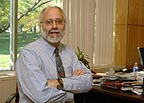September 18, 2007
New education dean likes to 'problem solve'

Caption follows story
"It was a full first month — very time consuming, with a lot to learn and deal with, but invigorating, too," Teitelbaum said.
"I feel I can be helpful — to the faculty, the students and the life of this college. That's why I wanted to take on this role. Fortunately, the people I have dealt with have been very friendly, welcoming and supportive."
One of the things he's found over the course of these first few weeks is the extent to which others outside the University rely on his college.
"We are constantly asked for help by schools, social service agencies, recreational facilities, labor unions — we spend a huge amount of time addressing these requests," he said.
"Just in the month I have been here, I have heard from a number of external groups looking to us to deliver programs off campus. The number of programs we offer is already significant, and yet the requests keep coming in."
Teitelbaum also learned that his college ranks at the top among those in the University in winning grant funds from outside sources, an important achievement in these times of dwindling financial support for higher education.
"Our faculty and staff are going out there and getting grants in areas that are relevant to their interests, and serious, important research is being done in our centers," he said.
The caliber of his faculty pleases him very much.
"They are hardworking and productive," he said. "Many came up through the profession, and they take it seriously. They are dedicated teachers."
But all is not sweetness and light. Adapting the real estate mantra, Teitelbaum said the biggest challenge he faces is "resources, resources, resources."
"We lack faculty positions, college infrastructure, space, up-to-date equipment, professional travel money for faculty and students who are presenting at conferences," he said.
"I'm sure every college across campus would say the same thing, but I think this college has been hit particularly hard. I have heard of cases where there's no money for professional brochures. How do you recruit students without them?"
Competing for students, both on and off campus and in the college's longstanding military programs, represents a significant challenge, Teitlebaum said, as do melding the diverse units within the college into a cohesive community and winning for them and their faculty the attention and support they deserve for the good work they do.
"And did I mention resources?" he said with a smile.
Still, he has both the will and, he believes, the ability to address obstacles he and the college face. He can see the big picture, but he's also comfortable working with the many details of his position.
"I like to problem solve and to help people — that's why I went into this work," he said.
"That's what I like about being a college administrator. It's not a burden to me to work with my colleagues on the challenges that confront us; it's something I fundamentally enjoy.
"And as an old high school social studies teacher, fostering community, fairness and democracy mean a lot to me. I try to bring those qualities to everything I do."
